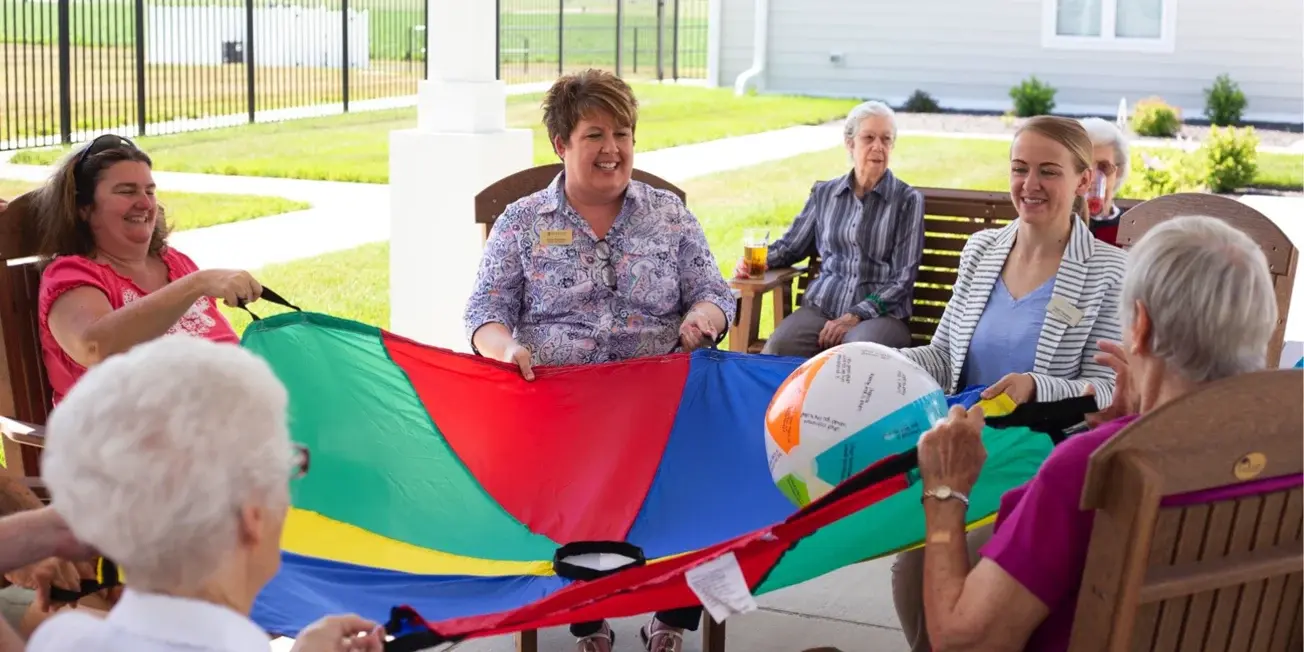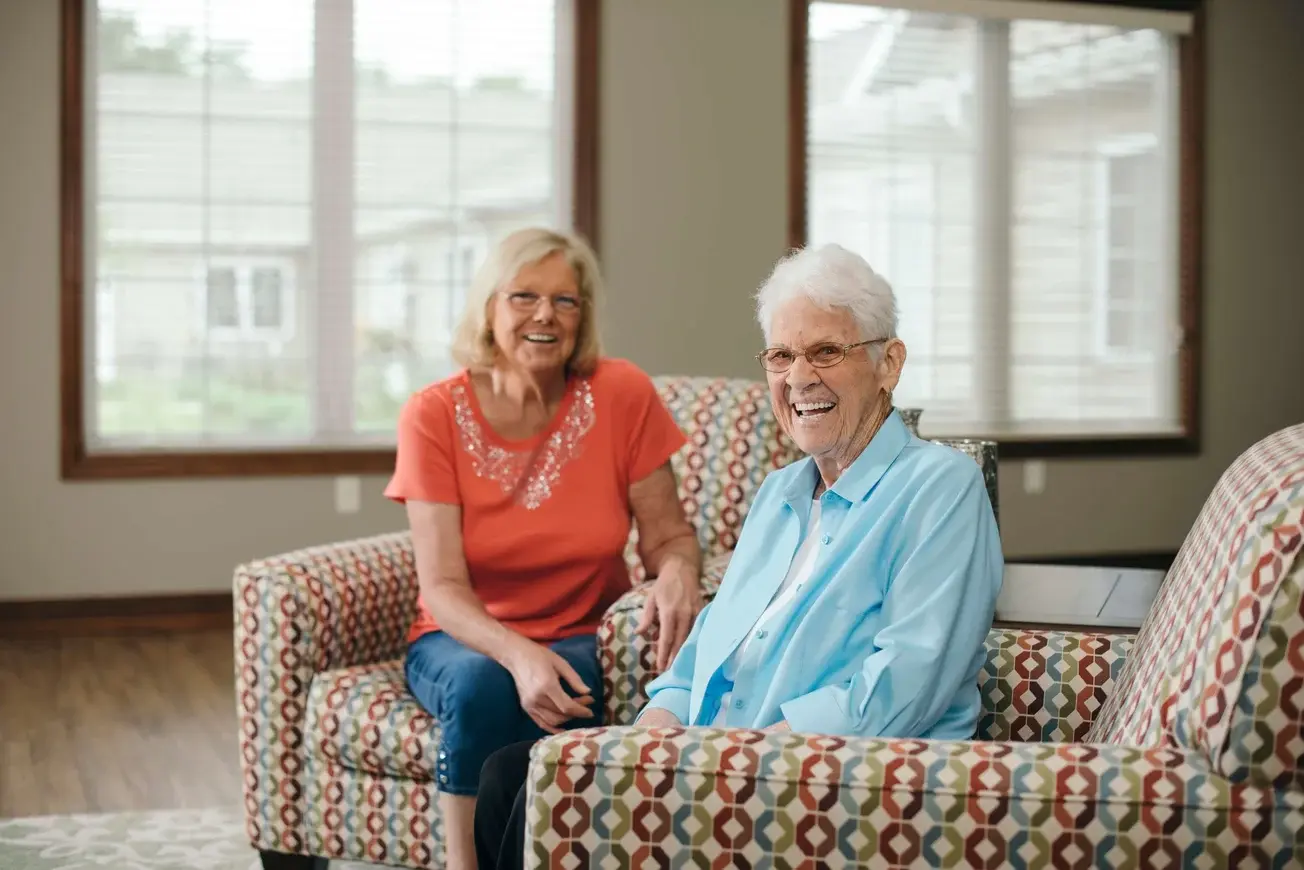Having the Conversation About Senior Living
Not making a decision is making a decision. Putting off a discussion about senior living can mean wasting valuable time that could be spent on a richer, more connected life.

Download this guide or share it with a family member as you begin your search.

Download the PDF
Download a PDF version of this guide by filling out this form, or keep scrolling to read.
Share this resource
Copy the link to share with friends and family via text, or use the button to send it by email.
Table of Contents
Recognize when it’s time for a conversation. Prepare for the conversation. Start the conversation about senior living. Know what to say (and when to listen). Respond to common objections with compassion, understanding, and reality. Get your parent or another family member excited about senior living. Cedarhurst can make the conversation easier.
1. Recognize when it’s time for a conversation.
Broaching the topic of senior living can feel like acknowledging what's on everyone's mind. As your spouse, parent, or family member gets older, their needs may have changed. While some seniors may require support with activities of daily living, other seniors are still every bit as independent as they were 20 years ago.
The decision is yours to make as a family. By addressing your questions and concerns up front, each of you can feel a sense of peace about the road ahead.
Is it time to talk about independent senior living?
Even if you, your spouse, your parent, or your family member doesn't require special care, independent senior living is still a smart option for many.
Why would someone who doesn’t need assistance with daily activities move to a community? Because it’s a great way to discover a fulfilling social life! Independent seniors can enjoy a full calendar of activities and provide families and older adults with peace of mind knowing that support is available should anything happen or if changes in health happen unexpectedly
Is it time to talk about assisted living or memory care?
When most people think of having “the conversation” with a parent or family member, they’re thinking of assisted living and memory care. While seniors who choose independent living don’t need a high level of care, seniors who do require more care may benefit from assisted living or memory care services.
Ideally, the conversation starts far before the need arises. In a perfect world, the conversation about senior living is an ongoing one, where family members agree about what is going to happen in the future.
The reality is that most people prepare for the conversation after they notice a sign that it’s time, including:
- Social withdrawal after a period of living alone
- Unexpected weight loss
- A fall or other incident where your family member's health is put in jeopardy
- Lack of care for oneself, such as letting grooming and hygiene go
Explore Related Resources
.webp)
A Comprehensive Guide to Senior Rightsizing
Rightsizing doesn't have to be overwhelming. Get our comprehensive guide to start the process and discover the financial and safety benefits of having a space that's "just right."
Start Your Rightsizing ProcessIs senior living right for your family?
Answer questions about your family member's needs and receive results in under 5 minutes.

2. Prepare for the conversation.
At this stage, you still have time to gather all the right people and information to prepare for the conversation. This includes bringing in advice and support from healthcare and senior care professionals, along with family members. The more support you have and the more prepared you are with information, the more productive the conversation can be.
Talk about the specifics.
You’ll also want to have specific senior living communities and care options in mind when you talk to your parent or family member. There are different options for different levels of need, including independent living, assisted living, and memory care services.
First, ask around about good senior living communities. Ask your family member if they’ve visited friends in communities and what they’re like. If you know anyone with a family member living in a senior living community, ask general questions about what’s good and bad. Touring communities in person or virtually is the best way to really get to know what a senior living community offers.
- Delicious food
- Happy, engaged residents
- Caring and qualified staff members
- Lots of great amenities and services
- General cleanliness
Explore Related Resources

Insider Tips: Navigating Assisted Living Community Tours
Touring assisted living? Learn the essential questions to ask about care, community, and costs.
Get the Tips
3. Start the conversation about senior living.
Getting older doesn’t make someone less thoughtful or strong-willed. This can make the conversation about senior living difficult, but don’t just give up—there are things you can do.
If you haven’t started the conversation about senior living, and you think it’s going to be a sensitive one, there are a few steps you can take to make sure you’re understood.
Choose the right person to lead the conversation.
First, ask yourself whether you’re the right one to start the conversation.
Can things get a little emotionally charged between you and your family member? If so, is there someone else who may be a better bet to start the conversation, such as another family member or even a close friend of your parent? Is there a sibling who always seems to be able to get through best to your mom or a cousin your dad always relates well with?
Different personalities may have different approaches to this discussion topic, but the message should be the same. Sometimes the messenger just needs to be a neutral party that your family member will listen to.
If things have dissolved into unproductive arguing every time you’ve broached the topic with your family member, think of the one person they’ll listen to, and ask them to lead the discussion. That means the immediate family may need to take a back seat during the conversation. Instead, consider reaching out to trusted people, such as a family pastor or priest, your family member’s physician, or longtime friends.
Keep the conversation positive and as comfortable as possible.
Make sure your conversation doesn’t look like an intervention—keep it positive and comfortable. Take your family member’s fears and anxieties into consideration and validate their feelings.
When you have the conversation matters. A quiet afternoon on neutral territory works best. When strong emotions and family are involved, it can get complicated.
Consider the advantages and disadvantages of a private conversation vs. a team effort.
Although you should involve other family members and experts in the overall decision about whether senior living is desired or necessary, the conversation may need to be more private—and it definitely needs to be respectful.
Your parent or family member may express a readiness for senior living, but they still can’t seem to make the change. This is where a private, one-on-one conversation may be most appropriate. They want to make the decision, but they don’t want an audience. You know your family member—if they are adamant about privacy, make the conversation private.
On the other hand, if you know a conversation will only be effective as a group effort, gather your troops and make a plan, including:
- Deciding who is the best person to lead the conversation to make it most productive
- Getting everyone to agree to not waver from the bottom line
- Preparing reasonable answers for reasonable objections

4. Know what to say (and when to listen).
So, what exactly do you say to even start the conversation?
Today’s senior living communities don’t bear much resemblance to the old stereotype of a “retirement home.” Senior living now happens in living, breathing, bustling communities where older adults can thrive.
Break the ice and warm up the conversation.
Start by asking questions that reflect your concerns, such as:
- How is taking care of the house going?
- How did your last visit with the doctor go? What did they have to say?
- Making meals for yourself every day is a lot of work, isn’t it?
If your parent or family member has already expressed that they don’t want to talk about this topic, start by recognizing that it’s hard to talk about by saying things such as:
- I know this isn’t something any of us like to talk about, but we really should. Your needs are the most important here—let’s discuss them.
- I know this isn’t a fun conversation for you, but I need to make sure you’re happy and safe.
- Can we talk about senior living again? I recently toured a community I think you’ll love.
If your parent or family member previously talked about senior living but now has cold feet, warm up the conversation with the following:
- You loved the idea of not having to worry about the yard and the gutters. Do you really want to go through another fall with all of the leaves?
- I remember how much you wanted to downsize last year. We can help you find the perfect senior living apartment to move the process along.
- You always told me that if it wasn’t safe for you to live by yourself, you would consider senior living. Are you still thinking about that?
And then ... listen.
Listening is key. Let your parent or family member know that you understand this is a hard decision. Deciding what to do for this next exciting stage of life is a big deal.
Listen to their concerns, and actually hear them. Validate their fears and concerns, but let them know that the fears and concerns you and other family members have are also real and that checking out a senior living community can’t hurt.
Listening is the best way you can truly understand where your family member is with their decision about senior living, so you can go through this journey together.

5. Respond to common objections with compassion, understanding, and reality.
Your parent or family member might not be receptive to hearing about senior living even if their need for assistance becomes undeniable. No matter what, they may have a lot of objections, so it’s good to have responses ready.
When someone is apprehensive or getting cold feet, it’s usually caused by fear of the unknown and anxiety that goes along with any major life change. Your parent or family member’s objections are valid and real, and they should be listened to and met with understanding paired with a gentle reminder of reality.
For example:
Objection: I want to stay in my house.
Response: I can understand that you want to stay here. There are so many memories, and you’ve always loved this house. But we know that it’s not safe for you to be here by yourself, and home care gets expensive and doesn’t give you the opportunity for more social activities. I think you would be really happy in senior living. It would be an adjustment, but you'll do great.
Objection: I can’t leave Fido.
Response: Of course, you can’t leave your dog! We would never even consider a place that doesn’t take pets. Don’t worry; Fido is family!
Objection: I don’t want to miss out on family events.
Response: We would never let that happen! At a senior community, not only can our family visit often, but we can also make sure you get to attend all the family events you want to. You’ll never have to miss a birthday party—even if we bring the party to you.
Objection: I’m fine here. I’m still safe.
Response: You can still do so much, but you keep falling asleep in the chair because the stairs are too difficult. This house would be too much for me at my age. If you had an apartment where assistance is available, I think you would worry less and sleep better.
Explore Related Resources

5 Ways to Approach a Family Member About Senior Living
Facing resistance when discussing senior living? This guide provides a compassionate, step-by-step approach to help you navigate this sensitive conversation and move forward together.
Get the Step-by-Step Approach
6. Get your parent or another family member excited about senior living.
The interesting thing about the senior living conversation these days is that seniors often wind up going from “I don’t think so” to “Why didn’t I do this earlier?”
Once your family member agrees that senior living is probably a good idea, all they have to do is take a tour to see how much fun they could be having while feeling safer and more supported on a daily basis. They’ll get excited about having someone else to hand off home maintenance to, delicious food and plenty of company to share meals with, enriching activities galore, and all the necessary amenities.
The best part is your family member can rest assured knowing they’ll be safe and get the care they need while also living as independently as possible.
The approach to independent senior living is a little different.
We’re talking a lot about having the conversation with family members who need certain levels of assistance, such as those provided in assisted living and memory care services. But independent senior living has its own major perks for active seniors who are showing no signs of slowing down.
When your super-active parent or family member no longer has to worry about household maintenance or chores, they get to focus 100 percent on what they love to do. That means hobbies, cultural events, family celebrations, hanging out with friends, traveling, and trying all kinds of new things. That’s the beauty of independent senior living: Seniors can make it what they want.
Given the perks, seniors may even plan ahead to move into independent living communities, right up until they get to the age where it’s time to make the change. Even with all of the perks and being able to still do everything you love, sometimes getting past the personal stigma of being “old enough” to qualify for senior living is a huge hurdle.
If you find yourself in a situation where your parent or family member has decided to back out of their independent living plans, first take a moment to figure out why they got cold feet. If it’s just a matter of not feeling like they’re ready for a change, have a candid conversation about what they fear most about it. Remind them why they decided on independent living in the first place, which is usually:
- More time to do things they love
- Freedom from household maintenance
- The practical benefits of downsizing or rightsizing
This, along with touring communities to see the apartments, perks, and amenities for themselves, can usually get a parent or family member back on track with their independent senior living plans.
Explore Related Resources

Top 17 Delicious Meals at Cedarhurst Senior Living
Discover a dining program that's designed to delight at every stage of life. Our seasonal, farm-fresh fare offers residents the opportunity to gather together and savor delicious flavors.
Browse Dining Options
What Are the Social Benefits of a Senior Living Community?
Learn how a community can provide the meaningful connections, friendships, and shared experiences that are essential for a fulfilling life.
Read About the Social Benefits
7. Cedarhurst can make the conversation easier.
If you really want to make the conversation as easy as possible, talk to Cedarhurst.
Cedarhurst communities are dedicated to giving seniors a place to truly be themselves and make the most of this next stage of life.
Residents not only get top-of-the-line amenities and a bevy of enriching activities and services, but they also live in a space where unique people continue doing the unique things they love—such as raising butterflies. We go the extra mile with our Pair to Prepare® program, which offers extra new resident support, and our Cedarhurst Promise, which is a 60-day money-back guarantee. We really do understand and respect how residents like to live.
Learn more about what Cedarhurst has to offer by chatting with us today, and see how we can help you get ready to have the conversation.
Find a Community Near You
Explore Related Resources

Discover Cedarhurst
Ready for a different kind of senior living? From chef-prepared meals to personalized support, find out what sets Cedarhurst communities apart.
See What Sets Us ApartResources
Create a Clear Road Map for Your Family's Senior Living Journey
Taking a step forward on your family's senior living journey can feel daunting, but you don't have to travel the road alone. Explore helpful tools, tips, and resources to support you on your journey.

Find the Right Level of Care
Understand your care needs by learning about ADLs and IADLs to discover the support that's right for you.
Start Assessment
Understanding the Cost of Senior Living
Concerned about costs? Compare senior living with home expenses using our Senior Living Cost Calculator.
Calculate the Costs
Signs It's Time for Senior Living
This resource helps you identify the key indicators that a move to senior living may be the right choice. It provides clear signs to look for, helping you to move forward with confidence.
Learn the Signs
What to Look for in a Senior Living Community
Don't start your search without a plan. This guide provides a comprehensive checklist of top tips and essential questions to help you find the best community for you.
Find Out What to Look ForFind a Community
Explore locations to view pricing, floor plans, and care options near you.